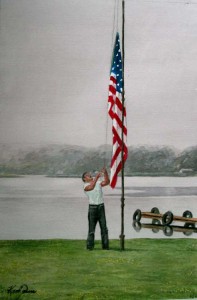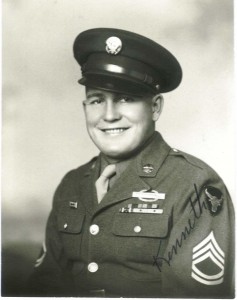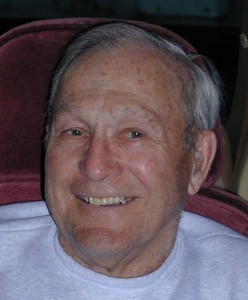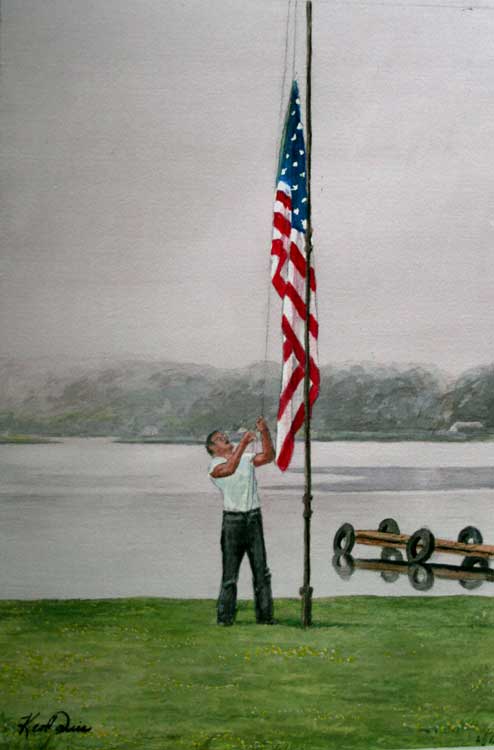 Ken was still a teenager when he enlisted in the army. He was one of twelve children, and he recognized his chance to make something of himself. He couldn’t know the United States would be at war within a matter of months.
Ken was still a teenager when he enlisted in the army. He was one of twelve children, and he recognized his chance to make something of himself. He couldn’t know the United States would be at war within a matter of months.
At eighteen, Ken found himself in the thick of battle defending the Philippines against the onslaught of Japanese attack. One day he lay behind a log and watched as enemy soldiers overran his position by the hundreds. Ken and a companion hid their rifles and surrendered. It marked the beginning of a three-and-a-half year nightmare. Ken became a prisoner of war.
The grim realities of prison camp quickly decimated Ken’s health. He’d survived the grueling Bataan death march only to be wracked with malaria and dysentery. In prison camp, the privilege of staying alive depended on a prisoner’s ability to work. Those gravely ill or incapable of labor were shot or perhaps buried alive. The young man’s weight dropped below one hundred pounds, but he struggled to make himself useful enough to avoid execution. It was no good; frail as he was, Ken fought a losing battle.
The war drew to a close and Japanese defeat became a looming certainty. As the captors’ prospects dwindled, their atrocities increased in number and intensity. The Japanese began executing prisoners at random.
 One day, Ken found himself lying beneath a thatch roof hut with several other prisoners. As a Japanese officer shouted commands from the hut’s balcony, prisoners were dragged from the shelter in pairs to a nearby rice paddy. The bonds were cut from their hands, and they were summarily bayoneted to death or shot in the head.
One day, Ken found himself lying beneath a thatch roof hut with several other prisoners. As a Japanese officer shouted commands from the hut’s balcony, prisoners were dragged from the shelter in pairs to a nearby rice paddy. The bonds were cut from their hands, and they were summarily bayoneted to death or shot in the head.
Ken watched his friends dying two by two, knowing his time would come. As evening approached, the shrill voice of the Japanese officer shouted yet another command. Ken and his friend were wrenched from beneath the hut and dragged into the rice paddy. Kneeling in the mud, he waited in terror for the inevitable. There was another shout from the hut—then an explosion in his head. Ken fell forward into the filthy water.
He hadn’t been shot. He’d been struck with the butt of a rifle. The sun had gone down, and the Japanese didn’t conduct executions after sundown. As he regained his senses, Ken knew this would be his last night on earth. As sure as the sun would rise in the morning, the executions would continue.
Huddled sleeplessly that night, Ken’s life flashed before him. He saw the face of his mother. He recalled the admonitions of his father, a stern Nazarene evangelist. He thought of his brothers, some of them fighting for their country in theaters of war across Europe. Ken whispered his farewells.
He also remembered his sins. Every sin he’d committed, from minor indiscretion to shameful transgression, flashed before his eyes. Yet his guilt gave way. It vanished in a great wave of peace that rose up and flooded Ken’s soul. The faith he’d placed in Christ years ago, as a small boy, was suddenly present and potent. He was reminded of the price paid for each of those sins. He was forgiven.
By the time Ken watched the sun rise, a miracle had taken place. Facing certain death, he felt no fear. He’d made his peace with God, and he was emotionally overwhelmed with grace and forgiveness. The cool silence of dawn was shattered by the call of the executioner. Ken heard the approaching boots of the guards. They yanked him to his feet. Then they led him not to the rice paddy, but back to the prison sector.The executions had halted.
Ken would live to return from one of history’s bloodiest conflicts—by a few seconds. On the day of liberation, he was little more than a skeleton. Sick and half-starved, his weight was 85. He was so weak that he needed assistance to clear a two-inch board at the back of the truck bound for freedom.
 This is a story I know by heart. Its hero is my father, Ken Davis Sr. And the most amazing element of the narrative is the placing of his emphasis in its telling. He focuses not on God saving him from the bayonets and bullets of enemy soldiers, but on God saving him from his sin. If God could forgive the sins that paraded before him that dark night, then not even the razor edge of a bayonet, or the brutal impact of a bullet, could separate him from that love.
This is a story I know by heart. Its hero is my father, Ken Davis Sr. And the most amazing element of the narrative is the placing of his emphasis in its telling. He focuses not on God saving him from the bayonets and bullets of enemy soldiers, but on God saving him from his sin. If God could forgive the sins that paraded before him that dark night, then not even the razor edge of a bayonet, or the brutal impact of a bullet, could separate him from that love.
My father had endured considerable physical abuse; malnutrition and malaria had taken their toll. The medics examined my father and concluded he would not live to old age. Certainly, they told him, he couldn’t have children
That was more than half a century ago. They underestimated my dad. He’s seventy-five now, and I’m one of the five children he didn’t have. I cling to one lesson from the fascinating stories of Dad’s POW experience. In those dark, horrible moments when death confronted him, my dad had an authentic supernatural encounter with grace. Peace overcame him; fear was cast out.
“Who shall separate us from the love of Christ? Shall trouble or hardship or persecution or famine or nakedness or danger or sword? As it is written: ‘For your sake we face death all day long; we are considered as sheep to be slaughtered.’ No, in all these things we are more than conquerors through him who loved us. For I am convinced that neither death nor life, neither angels nor demons, neither the present nor the future, nor any powers, neither height nor depth, nor anything else in all creation, will be able to separate us from the love of God that is in Christ Jesus our Lord” (Romans 8:35-39).
My father was finally forever set free on April 18th 2006. He lives with the Lord he loved so much. A fellow hero who understands the price of freedom.
Story adapted from my book “Lighten Up” published by Zondervan


Comments
Beautiful!
Ken,
This was a beautiful story. How blessed you are to have been raised by such a man. Thank you for sharing his story this day as we honor America’s military heroes. Your father was surely one of them.
Ken,
What an amazing man your father was for many reasons, but especially as a witness to God. Thanks for sharing his story… it is nearly unbelievable, but so uplifting because of God’s peace, grace and forgiveness. Very touching.
My dad also served in the Phillipines, but at the end of WWII, not the beginning. Although wounded in battle, it was not so serious that he couldn’t remain in the Pacific and help close out that terrible conflict, not coming home until 1946.
Today he is fighting another battle, this time with cancer. I called today to thank him for his service to this wonderful country. Soon this battle will be over, but he will have his final victory as he celebrates with his savior.
Thank you to all who have served our nation. You are all heroes.
That is an amazing story Ken! Your Dad’s influence lives on, like a stone in a pond – the effects are endless. Your Father influenced you – you are influencing so many – who knows who they will influence? What an amazing heritage you have!
Thankful for your sharing about your dad. Thankful to God for his love and forgiveness! Thankful for our freedom in the US. When watching the news about Ft. Hood, I wrote a little poem:
The Night Before ‘happy holidays’
Twas the night before ‘happy holidays’
And all through the White House,
Not a protest was heard,
Not even a pout!
The unborn and unwanted were no longer guests there,
killed by money forced from tax-payer health care.
The stocking for ‘the great one’
Hung with much fan fair.
For he felt he alone knew the answers–
He would not share!
Soldiers far from home and soldiers close by
There sacrifices did not even cause him to blink an eye!
“Don’t jump to conclusions,” his words of comfort were,
As the families spent Christmas by a fresh mound of dirt.
Joblessness is good the news journalist say.
Not caring that more and more people have bills left unpaid.
Bailouts are given to big company cheats–
Their top execs flying comfortably to tropical heat.
Twas the night before ‘happy holiday’
But twas really quite sad,
For true Christmas has been lost
Along with America’s proud past.
Will Americans notice?
Will Americans care?
For little by little
Our freedoms are no longer there.
-drr
Oh, how I love Jesus!
Wonderful tribute, a profound story of Hope! Thanks for blessing us.
That’s where your ‘big rocks’ perspective comes from …. you had a head start from your father :}
Very moving story. I am very grateful for your father’s service to our country.
Ken, what a beautiful story of your father’s love for Jesus and what a beautiful legacy your father left – you. Partly because of you my husband is now also with Jesus whom he came to love in the last four years of his life here on earth. Jim was not a believer the time he went with me to my church picnic. For the devotional period your video “Super Sheep” was shown. I did not remember it, but Jim did. Within a few months of going to church Jim was saved. About 2 years later he was diagnosed with lung cancer. During that time he reminded me of your video and asked me if I could find out where I could get it and buy it for him. I did. I also bought all of your videos. During a very difficult time Jim always looked forward to viewing one of your videos. I truly believe his faith grew stronger because of the salvation message you always presented. I remember once I sent you an e-mail telling you how much Jim and I liked your videos and you sent one back to me telling me you were praying for Jim and to say “hi” to him. Since that time he refered to you as “my friend, Ken” to our family. God bless you.
Yes, now it comes back to me. I love this story, so I posted it to my FB page. Thanks for sharing it Ken. Happy Easter my friend.
I will thank your Father when I see him in heaven! I have seen you live in Arizona, but didn’t know about your dad until now!
Sincerely,
Deb Graszer
I heard this read this morning. Very touching.